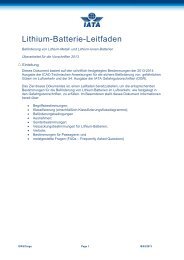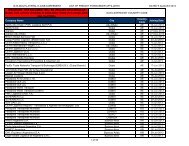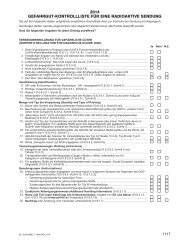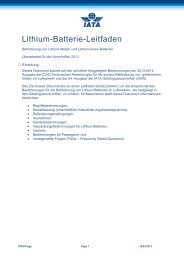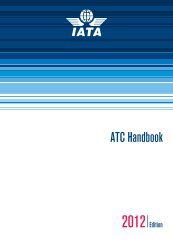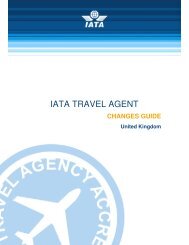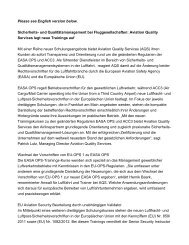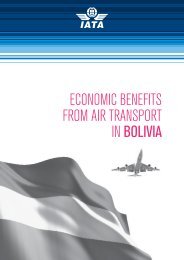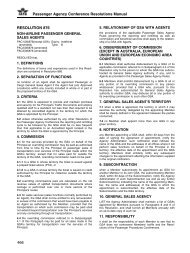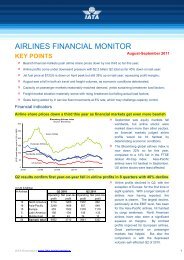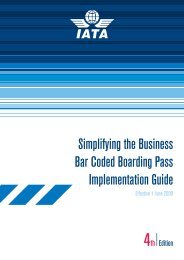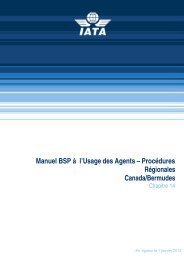Create successful ePaper yourself
Turn your PDF publications into a flip-book with our unique Google optimized e-Paper software.
Positive economic measures<br />
are necessary, but they must<br />
be coordinated through<br />
ICAO.<br />
The European Union Emissions<br />
Trading Scheme (EU ETS) is a<br />
tax that will have almost no effect<br />
on aviation’s carbon emissions,<br />
will distort competition,<br />
and is a challenge to national<br />
sovereignty.<br />
The controversy over the EU’s<br />
incorporation of aviation into<br />
its emissions trading scheme<br />
is a distraction from the efforts<br />
to agree on a global, marketbased<br />
emissions solution at<br />
ICAO. Moreover, it threatens<br />
the fragile global economy if<br />
nations respond with a trade<br />
war.<br />
Europe deserves credit for<br />
highlighting environmental<br />
concerns on the international<br />
agenda, but its unilateral<br />
scheme is widely seen as an<br />
attack on national sovereignty.<br />
The EU ETS also fails to meet<br />
the guidelines for market-based<br />
measures that were adopted<br />
at the 2010 ICAO Assembly.<br />
These guidelines include<br />
avoiding the double counting<br />
of emissions, ensuring that the<br />
money raised from any measures<br />
is spent on directly reducing<br />
aviation emissions, and<br />
preventing market distortion.<br />
The answer is for a global<br />
emissions reduction framework<br />
to be agreed to at ICAO in line<br />
with the principles of transparency,<br />
equitability, and simplicity<br />
and to achieve genuine emissions<br />
reductions by airlines.<br />
It was agreed at the 2010<br />
ICAO Assembly that proposals<br />
for a global, market-based<br />
scheme would be brought<br />
forward in time for discussion<br />
at the next ICAO Assembly in<br />
2013. To meet this expectation,<br />
environmental working groups<br />
within ICAO are developing<br />
options for countries to consider<br />
by the end of <strong>2012</strong>. <strong>IATA</strong>,<br />
Airports Council International,<br />
the International Coordinating<br />
Council of Aerospace<br />
Industries Associations, and the<br />
Civil Air Navigation Services<br />
Organization, as observers to<br />
ICAO, are able to give technical<br />
support to the working groups,<br />
but all decision making rests<br />
with the member countries.<br />
In parallel with discussions<br />
at ICAO, the United Nations<br />
Framework Convention on<br />
Climate Change process<br />
continues to seek a comprehensive<br />
global agreement on<br />
carbon reduction. The annual<br />
Conference of Parties (COP)<br />
meetings have a wide-ranging<br />
agenda, including debates on a<br />
climate change adaptation and<br />
mitigation fund. Some progress<br />
was made at COP17 in Durban<br />
in December 2011. COP18 will<br />
be held in <strong>2012</strong> in Qatar.<br />
The aviation industry keeps a<br />
watching brief on these discussions<br />
and is ready to offer technical<br />
advice when requested.<br />
Similarly, the industry has been<br />
invited to observe the discussions<br />
at the Rio+20 meeting,<br />
which will mark the 20th<br />
anniversary of the original Rio<br />
Earth Summit. The meeting will<br />
be used to add impetus toward<br />
sustainable development.<br />
33<br />
Through carbon offsetting,<br />
passengers can neutralize their<br />
portion of an aircraft’s carbon<br />
emissions on a particular<br />
journey by investing in carbon<br />
reduction projects. <strong>IATA</strong> has<br />
introduced an industry-wide<br />
carbon offset program that<br />
builds on the lessons learned<br />
by individual <strong>IATA</strong> member<br />
airlines and that addresses the<br />
challenges raised.<br />
The <strong>IATA</strong> offset scheme, used<br />
by 19 airlines, is designed to<br />
help partner airlines introduce<br />
an offsetting option to their<br />
customers. It brings standardization<br />
to the carbon offsetting<br />
process and supports an<br />
overall cooperative approach to<br />
managing the industry’s impact<br />
on the global climate. The <strong>IATA</strong><br />
scheme is also an option for<br />
companies looking to reduce<br />
the carbon footprint of their<br />
business travel.<br />
Emissions reduction roadmap<br />
Voluntary carbon offsetting<br />
provides an option for passengers<br />
to limit the impact of<br />
climate change. Communication is critical.<br />
<strong>IATA</strong> is committed to communicating<br />
aviation’s role in the<br />
environmental debate. As such,<br />
it supports the Air Transport<br />
Action Group (ATAG), a panindustry<br />
body for promoting<br />
aviation’s role in sustainable development.<br />
ATAG’s dedicated<br />
environmental website, www.<br />
enviro.aero, has been viewed<br />
by well over two million people<br />
since its launch.<br />
ATAG’s role in promoting<br />
aviation’s contribution to<br />
sustainable development saw it<br />
release a new study exploring<br />
the social and economic value<br />
of the industry. The Aviation<br />
Benefits Beyond Borders<br />
report, which builds on the<br />
work of the Oxford Economics<br />
Benefits of Aviation reports<br />
commissioned by <strong>IATA</strong>, gives<br />
aviation a strong voice in debates<br />
around future economic<br />
growth opportunities. (There is<br />
more on the benefits of aviation<br />
on page 14.)



